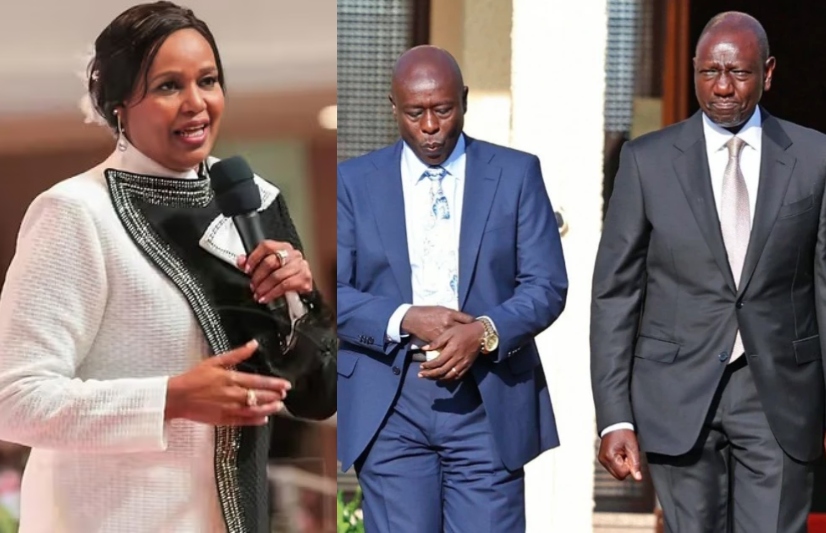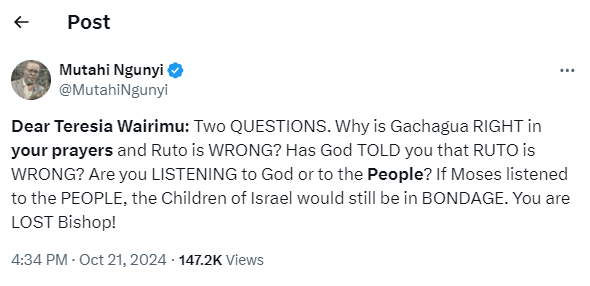
Ngunyi, known for his sharp commentary on Kenyan politics, took to social media to respond to remarks made by Wairimu during her Sunday sermon on October 20, 2024.
In the sermon, Wairimu, founder of Faith Evangelistic Ministry, expressed deep disappointment with President Ruto’s leadership and hinted that she regretted supporting him in the tightly contested 2022 presidential election.
Addressing her congregation, Wairimu lamented the state of governance under the Kenya Kwanza administration, citing internal power struggles that had overshadowed critical national issues such as the economy and healthcare.
The pastor’s comments were made in light of the growing rift between President Ruto and his former deputy, Rigathi Gachagua, who was impeached earlier this month.
“Instead of focusing on the things that matter, like fixing the economy and improving healthcare, the government seems more interested in endless fights,” Wairimu said.
“We thought this was a government of God because we voted for it, but it has become a government of internal conflict.”
In her remarks, Wairimu also suggested that leadership changes were inevitable, implying that the current government could face major electoral challenges in the future.
“In the next election, you will have to convince me. Someone must go home,” she warned, alluding to the possibility of significant shifts in Kenya’s political landscape.
Mutahi Ngunyi responded with a pointed critique of Wairimu’s stance, questioning why she seemed to pray for Gachagua while condemning Ruto.
Ngunyi’s comment highlighted the delicate relationship between religion and politics in Kenya, where religious leaders often hold considerable sway over public opinion.
“Dear Teresia Wairimu: Two questions,” Ngunyi wrote on X (formerly Twitter). “Why is Gachagua right in your prayers and Ruto is wrong? Has God told you that Ruto is wrong? Are you listening to God or to the people? If Moses had listened to the people, the children of Israel would still be in bondage. You are lost, Bishop!”

Ngunyi’s remarks reflect a broader conversation in Kenya about the role of religious leaders in political discourse.
While Wairimu is not alone in expressing dissatisfaction with the Ruto administration, her critique comes at a time when Gachagua’s impeachment has polarized both the political class and the public. Gachagua, who played a key role in delivering the Mount Kenya vote to Ruto in the 2022 election, was ousted following accusations of promoting divisive politics, among other charges.
Wairimu’s sermon, delivered with a mix of spiritual lament and political dissatisfaction, resonated with some who have grown disillusioned with the current government’s performance.
Yet, Ngunyi’s sharp rebuke underscored a discomfort with what he sees as religious leaders stepping into partisan politics while selectively framing their critique.
The country has a history of religious figures playing influential roles in politics, often acting as moral authorities during moments of national tension.
However, the lines between spiritual guidance and political partisanship have become increasingly blurred in recent years, as figures like Wairimu use their platforms to voice discontent with the country’s political leadership.
Related: 7 Scandalous Stories By Pastors That Shocked Kenyans

Leave a Reply